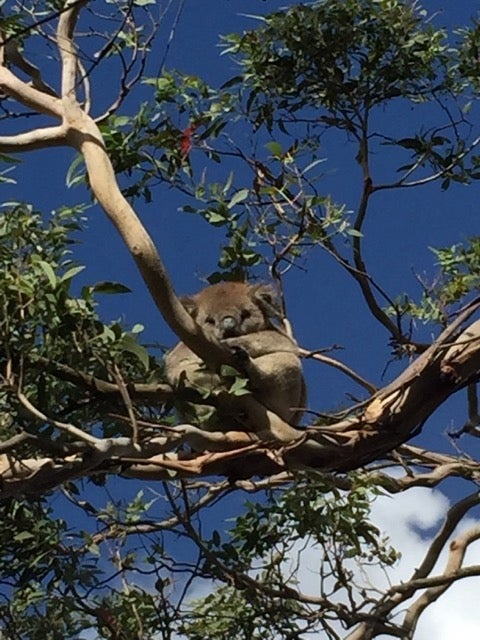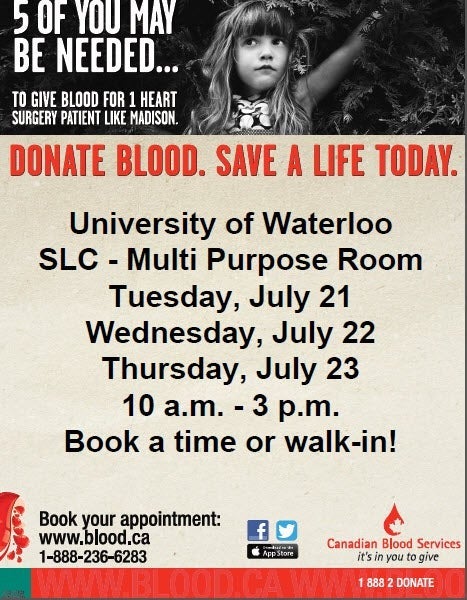Editor:
Brandon Sweet
University Communications
bulletin@uwaterloo.ca
Getting international experience Down Under
This is an excerpt of a staff spotlight article that first appeared on Waterloo International's website.

Jana Carson was one of the recipients of the first annual Staff International Experience Fund (SIEF). The SIEF is an award which enables staff members to travel to and engage in collaborative work with an international partner institution or institutions. Jana, Manager of Evaluation & Accountability in Institutional Analysis & Planning, received a joint award with her colleague in IAP, Jay Athia. In April 2015, they visited six institutions in Australia.
Jana writes about her experience travelling and working with her new Australian colleagues:
What was the purpose of your trip?
Jay Athia and I visited six institutions in Australia: three in Melbourne (Monash University, Swinburne University, and the Royal Melbourne Institute of Technology (RMIT)), two in Sydney (the University of Technology, Sydney (UTS) and Macquarie University) and one in Wollongong (the University of Wollongong).
We intended to learn promising practices related to: strategic planning, surveys, rankings, performance indicators and business intelligence systems. My hope was to bring back learning that we could put in place right away on our teams and for the institution as well as network with some of our peers who have been working in these areas for a long time and build on-going professional relationships with them. The opportunity to visit a variety of institutions gave me a broader picture of the Australian system and helped me gain a better understanding of the strengths and challenges of each university.
What is the Australian Higher Education system like?
The Australian higher education system shares some similarities with Canada, yet is in many ways very different. Higher education is one of Australia’s main exports, so there is a very strong focus on attracting international students and building international profile and partnerships. Funding and credentialing is regulated through the federal government and each institution is required to obtain a registration number before offering a new program (called a CRICOS number). This allows Australian universities to have a strong focus on understanding the market need for their programs and their ability to attract international students and partnerships.
What are your counterparts in Australia doing?
Universities in Australia are working hard to understand their strengths and to use data effectively to help support their decision-making. All the universities that we visited were keenly aware of the fierce competition they face (locally and internationally) to draw top students and faculty. Institutions are all trying to answer the same questions: who are our peers? How do we know we are doing well? How do we determine what we can do better? Where do we focus our efforts? Rankings data, survey data and strategic planning all help to answer parts of these questions.
- Strategic planning at the institutions we visited was often communicated widely across campus and incorporated in a couple of important ways: a) as a standing agenda item on executive management teams and b) reporting on progress as an integrated part of the budget and academic cycle. Timelines and reporting templates helped to facilitate this process but strong leadership from the University executive is what drove the process forward.
- Rankings and survey data helped inform discussions on research productivity and international reputation. Research intensive universities like Monash benchmarked themselves on a set of indicators using the Group of Eight as a comparator group. However, all universities were either in the process of, or had already developed, a set of indicators and peer institutions that they could use to help inform their performance. Universities like Swinburne and Macquarie used the Group of Eight as aspirational peers and Australian Technology Network institutions used that group as a comparator but also the Group of Eight institutions for some selected indicators. Other institutional data, such as enrolment data, was also used to inform strategic discussions.
- All universities in Australia participate in an employment survey after their students graduate and there was a strong focus on understanding what drives and contributes to good student outcomes when it comes to employment and employment skills after graduation.
- Bibliometric data (data on publications and citations) was used to help understand the university’s research productivity including areas where the University has strong research productivity as well as areas where the University has developed strong partnerships through publications with international and industry partners.
What have your learned that will change how you do your job?
So what does all this information boil down to? Some things I plan to build on right away are:
- Practices around our University ranking submissions that will help us better showcase our international reputation
- Strategies around how to coordinate and communicate about our surveys (for example, how to ensure good response rates and how to communicate the surveys we participate in and their results)
- Good practices around strategic planning – we brought back some great examples of the kind of reporting that is helpful for decision-makers and some examples of how can data be presented in a meaningful and engaging way
- Some examples of ways that Australian universities are using data to help inform their decisions that Waterloo could consider: survey data, bibliometric data and rankings data. We could also learn about how universities are handling areas like program planning, enrolment and entrepreneurship
Read the rest of the article on Waterloo International.
Blood drives, retirees and other notes

Canadian Blood Services will be running a blood donor clinic in the Student Life Centre's Multipurpose Room from Tuesday, July 21 to Thursday, July 23.
Both appointments and walk-ins are accepted. The clinics will run from 10:00 a.m. to 3:00 p.m. daily.
What's the big idea? A stretch of Phillip Street fronted by a number of former BlackBerry properties has been officially dubbed the "Idea Quarter," or IQ for short.
The new name is part of a "proposed vision for district transformation that could attract hundreds of technology, retail and service based businesses, tens of thousands of workers and – if private developers have their way – residential homeowners as well." Six former Blackberry buildings, among those sold to to San Francisco-based commercial real estate firm Spear Street Capital, were recently purchased by Bay Street financier Michael Wekerle’s The Waterloo Innovation Network (WIN), and are already home to a number of tech companies, with further redevelopment, particularly at 451 Phillip Street, already underway. Partners in the rebranding effort, which received city council's nod of approval this week, include the R+T Park, the Accelerator Centre, the Cora Group and the Marsland Centre.
Human Resources is announcing the following employee retirements, effective August 1, 2015:
- James Ashworth started at the University in June 2007 and retires as Electrician in Plant Operations
- Linda Blain began working at Waterloo in October 1989 and retires as Account Co-ordinator in Co-operative Education and Career Action (CECA)
- Frank DeMaio started at the University in February 2009 and retires as Business Manager in the Centre for Education in Mathematics and Computing
- Giuseppe (Joe) Facciuolo began working at Waterloo in March 1990. He retires as Serviceperson II (Mason) in Plant Operations
- Heide Flatt started at Waterloo in February 1995 and retires as Analytical Lab Instructor in the Chemistry department
- Pat Lafranierstarted her career at Waterloo in October 1974 and retires as Manager, Client Services in Information Systems and Technology (IST)
- Elgin Shantz started at the University in January 2002 and retires as Electrician in Plant Operations
- Terry Stewart began working at Waterloo in May 1978 and retires as Director of Information Technology in the Dean of Applied Health Sciences office
Congratulations all!
Employers on campus next week hosting employer information sessions include BlackBerry. Visit the information session calendar for more information.
Link of the day
200 years ago: Napoleon boards the HMS Bellerophon, surrenders
When and where
Mitacs: Foundations of Project Management 1, Wednesday, July 15, 9:00 a.m. to 5:00 p.m., TC 2218.
Science 101, Wednesday, July 15, 9:00 a.m. to 3:00 p.m.
EIT presents Dinosaur Tour, Wednesday, July 15, 1:00 p.m., Earth Sciences Museum.
Career Interest Assessment (Strong Interest Inventory), Wednesday, July 15, 1:30 p.m. to 3:30 p.m., TC 1214.
Information Session for Graduating Students, Wednesday, July 15, 4:30 p.m. to 5:30 p.m., EV-3 1408.
UW Farm Market, Thursday, July 16, 9:00 a.m., SLC lower atrium.
Work Search Strategies, Thursday July 16, 10:30 a.m. to 12:00 p.m., TC 1208.
Information Session for Graduating Students, Thursday, July 16, 11:30 a.m. to 12:30 p.m., AL 113.
Interviews: Proving Your Skills, Thursday, July 16, 1:30 p.m. to 3:30 p.m., TC 1208.
2nd Annual UWSA Golf Tournament, Thursday, July 16, Foxwood Country Club. Shot gun start 4:00 p.m.
University Choir: Bluegrass and Beyond, Saturday, July 18, 7:00 p.m., The Cedars Worship Centre.
Working in Canada, Monday, July 20, 10:30 a.m. to 12:00 p.m., TC 1208.
Blood Donor Clinics, Tuesday, July 21 to Thursday, July 23, 10:00 a.m. to 3:00 p.m., Student Life Centre multipurpose room.
Business Etiquette and Professionalism, Tuesday, July 21, 10:30 a.m. to 12:00 p.m., TC 2218.
Interview Skills for Academic Positions, Tuesday, July 21, 2:30 p.m. to 4:00 p.m., TC 1208.
Getting a U.S. Work Permit, Wednesday, July 22, 12:00 p.m. to 1:00 p.m., TC 1208.
EIT presents Dinosaur Tour, Wednesday, July 22, 1:00 p.m., Earth Sciences Museum.
25 Years of Engineering Science Quest (ESQ), Wednesday, July 22, 7:30 a.m. to 11:00 a.m., Sedra Student Design Centre, Engineering 5.
UW Farm Market, Thursday, July 23, 9:00 a.m., SLC lower atrium.
Velocity Fund Finals, Thursday, July 23, 11:00 a.m., Student Life Centre Great Hall.
Successfully Negotiating Academic Job Offers, Thursday, July 23, 2:30 p.m. to 4:00 p.m., TC 1208.
Medical School Applications, Thursday, July 23, 5:30 p.m. to 8:00 p.m., TC 1208.
Instrumental Chamber Ensemble concert, Sunday, July 26, 7:30 p.m., Conrad Grebel University Chapel.
GreenHouse Social Innovation Showcase, Thursday, July 30, 4:00 p.m. to 5:30 pm, Alumni Hall, St. Paul’s University College.
NanoMRI Conference, Monday, July 27 to Friday, July 31, Institute for Quantum Computing.
EIT presents Dinosaur Tour, Wednesday, July 29, 1:00 p.m., Earth Sciences Museum.
Minerals Tour, Wednesday, August 5, 1:00 p.m., Earth Sciences Museum.
Quantum Cryptography School for Young Students, Friday, August 7 to Friday, August 14, Institute for Quantum Computing.
Quantum Key Distribution Summer School, Monday, August 17 to Friday, August 21, Mike & Ophelia Lazaridis Quantum-Nano Centre Room 0101.
Retirement celebration for Peter Jordan, Wednesday, August 19, 3:00 p.m., Federation Hall.
Positions available
On this week's list from the human resources department, viewable through myHRinfo:
- Job id# 2877 – Library Associate: E-Learning & User Experience Assessment – Library, USG 7
- Job ID# 2879 – Executive Director, Facilities – Plant Operations, USG 19
- Job ID# 2881 – Online Learning Project Manager – Centre for Extended Learning, USG 10
- Job ID# 2886 – Online Learning Consultant – Centre for Extended Learning, USG 10
- Job ID# 2867 – Computer Systems Manager & Programmer – Psychology, USG 10
- Job ID# 2885 – Research Data Analyst – School of Public Health & Health System, USG 7
- Job ID# 2865 – Lab Instructor, Biomedical Engineering Program – System Design Engineering, USG 11/12
Internal secondment opportunities, viewable on myCareer@uWaterloo:
- Student Advisor – Co-operative Education & Career Action, USG 8/9
- External Relations Co-ordinator – Institute for Quantum Computing, USG 6